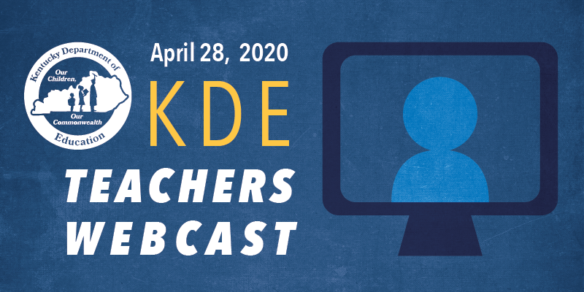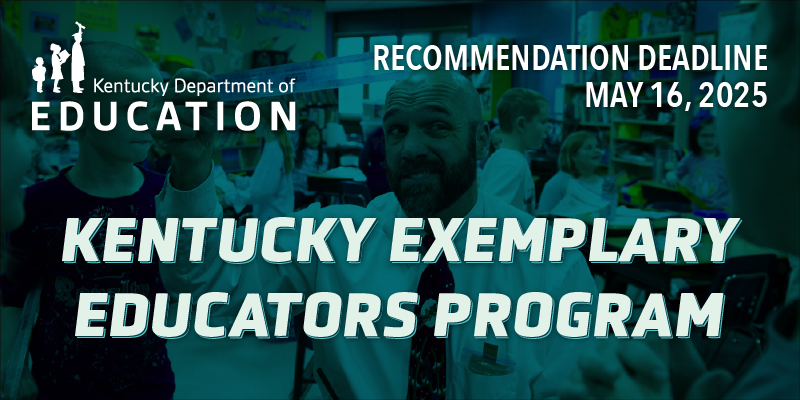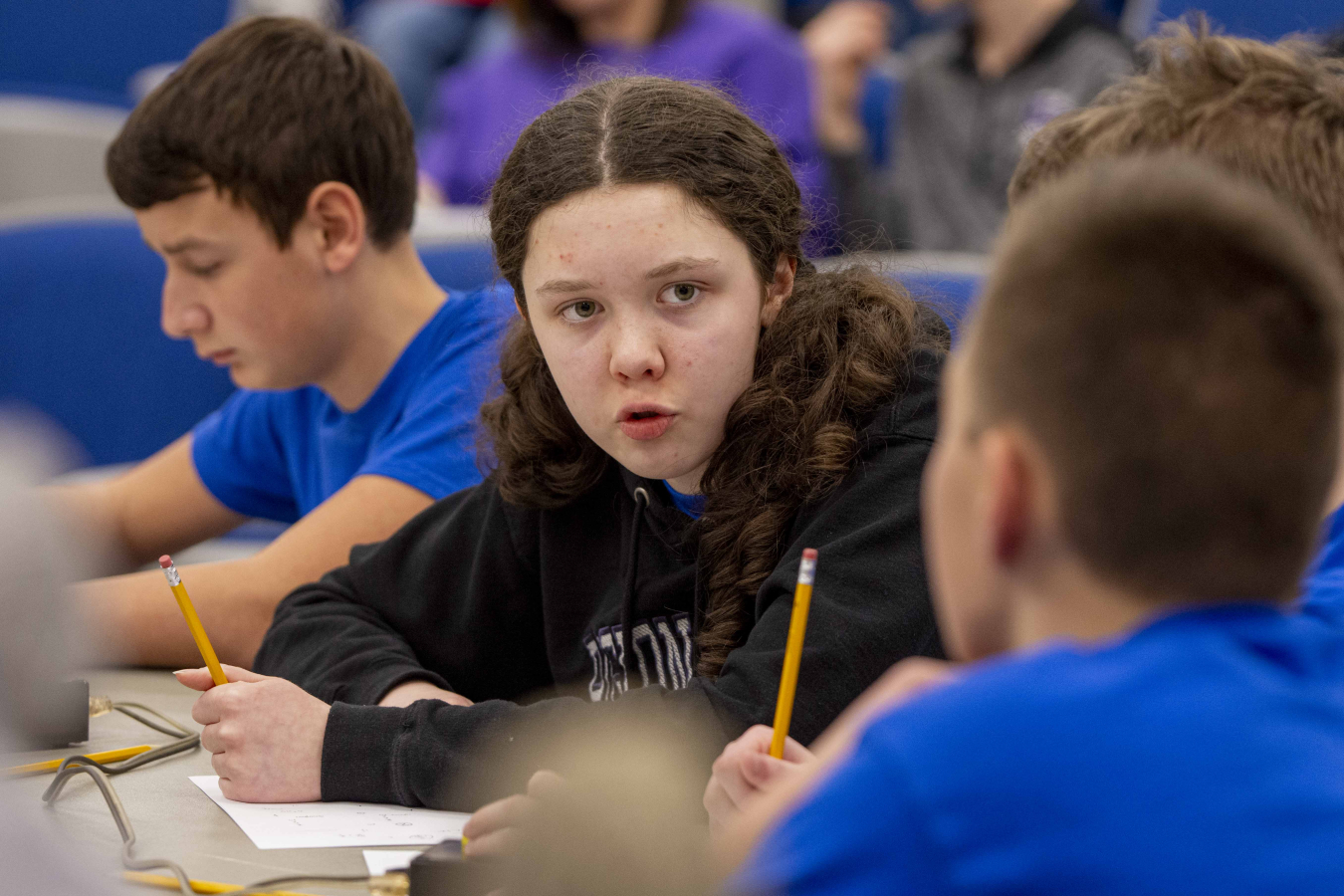
- The Teachers Webcast featured an array of educators from around the state alongside Interim Education Commissioner Kevin C. Brown and other members of KDE’s leadership team.
- KDE’s Program Coordinator for Comprehensive School Counseling, Damien Sweeney, talked with teachers about social/emotional learning (SEL) and how important it is during this period of NTI.
By Jacob Perkins
Jacob.perkins@education.ky.gov
Educators from around the state shared their experiences with non-traditional instruction (NTI) and what lessons can be learned during this unprecedented time during the inaugural Teachers Webcast on April 28.
All 172 Kentucky school districts, 53 area technology centers and the Kentucky School for the Blind and Kentucky School for the Deaf ceased in-person classes and began instituting NTI in response to a March 16 recommendation by Gov. Andy Beshear that has been extended through the rest of the school year.
“I know it’s hard and I know you’re exhausted. We’re hearing that. That does not go unnoticed,” said Interim Education Commissioner Kevin C. Brown. “Some of you have about four weeks left to go and we know that it’s going to be a very heavy lift, but just know that there are kids counting on you to do this and it will make a huge difference in their lives to have this additional instruction.”
David Cook, KDE’s director of innovation and coordinator of the NTI Program, reached out to superintendents and asked for them to identify a teacher they thought was doing a great job with NTI but would also be honest about the challenges.
The identified teachers made up the webcast’s panel. The teachers ranged from elementary to high school and represented districts that have been involved with NTI for a few years and those new to the NTI Program.
Cook facilitated a conversation with the panel about their experiences with NTI. The teachers said that so far, the program has been challenging but rewarding.
“Because I work in a very proactive district and building it was easy to achieve success,” said Danielle Cooper, who teaches at Conner Middle School (Boone County) in a new NTI district. “We were very reflective of what’s working and what’s not working. I feel like consistency has been key. …
“I figured out how I am going to meet daily with my kids. I meet with all four of my classes every single day since Day One of NTI. I feel like that has been very helpful in getting to have some type of normalcy for them.”
Another district that is new to NTI is Ohio County. Stacey Crowe, a special education teacher at Wayland Alexander Elementary School, said he feels he has worked much more through NTI than he did during a traditional school day. But once the initial shock of NTI wore off, he said he was able to get into the swing of virtual teaching.
“I started going back and doing what some of the other teachers in the school were doing,” Crowe said. “They were going into classrooms and recording themselves like the students were there. It was really unique to watch.”
Crowe and other teachers on the panel said they record themselves teaching, reading aloud or any other way that they feel is a good way to connect with their students and post the videos on ClassDojo.
Kandace Holder of Newton Parrish Elementary School (Owensboro Independent) said this is a great way to connect with her kindergarten students and alleviate some of the stress parents may be feeling.
“I have 28 kindergarten students in my room and my worry, in the beginning, was how was I going to contact 28 kindergartners and how was I going to teach them online since they’re very dependent,” she said. “I knew that the parents were going to be feeling extra stressed during this time because they were having to take on a new role as the teacher for their children.”
While the teachers spoke about a number of different apps that have been useful in their instruction – including ClassDojo, ShowMe Interactive Whiteboard and the Remind app – they did express the importance of being aware of the technological disadvantages that exist throughout the Commonwealth when designing NTI.
Not every school is 1:1 – one Chromebook to one student – and not every student has internet access at home.
“Beyond the technology barrier, I was also sensitive to the fact that some of the students couldn’t purchase groceries or supplies that were going to be necessary for hands-on learning at home. Even when not in a pandemic,” said Ashley Woodruff of McCracken County High School.
“Not every idea is going to work for all populations and every student. So it was important for me to give them choices to do at home.”
Several teachers on the panel echoed this sentiment and said choice boards – a graphic organizer that allows students to choose how they learn a subject – have been a popular aspect of NTI. Even if a student has access to a computer and the internet, they may feel more comfortable doing the work on paper.
“Each teacher got together on Google Meet and we planned out two reading, two math activities for every day of the week and then we alternated writing social studies and science throughout the week,” explained Paula Faulkner of Mason County Intermediate School. “One activity would be technology-based and one would be paper-based and then the child got to choose what they wanted to do.”
Faulkner said students that prefer paper-based packets can pick them up at the school or at one of the local businesses that have partnered with Mason County Schools to distribute NTI materials.
Social/Emotional Learning
Damien Sweeney, KDE’s Program Coordinator for Comprehensive School Counseling, talked with the teachers about social/emotional learning (SEL) and how important it is during this period of NTI.
“SEL, I know that you’ve heard it a lot, but it’s not just a buzz phrase,” said Sweeney. “Social-emotional learning doesn’t just happen in schools. It happens in our homes, in our communities.”
Sweeney discussed Abraham Maslow’s hierarchy of needs – physiological needs, safety needs, social belonging, self-esteem and self-actualization – and asked the teachers to consider which of these need to be repaired for our students during the COVID-19 crisis.
“Right now, with COVID-19, some of these needs have been broken,” he said. “Our priority should continue to be on the physiological needs of our students and the safety needs of our students. But what we hope, with all of our kids, is that we eventually get to those self-esteem needs, those love and belonging needs. The great hope is that we help students self-actualize.
“Right now the esteem of many of our kids, the love and belonging of many of our kids, and that self-actualization are just not there. We have so many kids that are just holding on. We have to find ways as educators to continue to build kids up and to continue to repair these things that have been broken.”
Sweeney mentioned that when he recently spoke with the Commissioner’s Student Advisory Council the students said school counselors and teachers are doing a great job at checking-in with students.
However, they said they aren’t being asked the simple questions: “How are you?” “What’s helping you get through this time?”
“These are things that we need to continue to ask during this unusual and unprecedented time,” said Sweeney.
Teachers Helping Teachers
Rob Akers, associate commissioner in KDE’s Office of Educator Licensure and Effectiveness (OELE), talked to the teachers on the webcast about the GoTeachKY initiative Teachers Helping Teachers.
The initiative, from KDE’s Office of Educator Licensure and Effectiveness, connects experienced educators with other teachers for virtual coaching and support, helping them deal with the stresses of the COVID-19 crisis.
“We have found that it’s kind of hard to go out and recruit teachers in the midst of a COVID crisis,” said Akers. “What are team has done is pivot a little and look at how we can help teachers through this new period of NTI, especially in districts that haven’t been doing it.”
There currently are 80-90 teachers who have volunteered to serve as mentors and will assist while school buildings are closed.
“What we’re looking for now are more teachers that may be new to NTI and want to be able to have conversations with people who are involved in NTI,” said Akers.
The mentors can help in areas such as content planning, finding resources, using technology and staying connected with students.
For more information about COVID-19:
- Kentucky Department for Public Health’s COVID-19 webpage
- KDE’s COVID-19 webpage
- COVID-19 Hotline (800) 722-5725




Leave A Comment